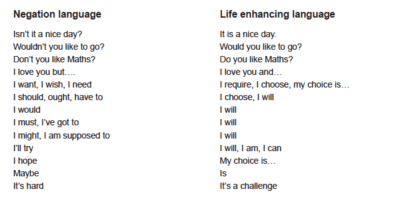Posts for Parents, Posts for Teachers, Raising Adolescents, Top Tips
Top Tips for Caring Communication with Teens

The task of ‘lighthouses’ is to help young people find their unique strengths and weaknesses, and then work out how to use them in a positive way. The period of adolescence is ripe for this vital new development to take shape.
Caring, empowering communication indicates an ability to understand another’s reality, a process which can be difficult when there is a difference of culture, age, gender or significant life experience. We often assume that others understand us when they can have a very different view point. Here are some possible different interpretations that can occur with adolescents.
There is great power in the words of suggestion.
Use “door openers”
“Door openers” are invitations to say more, to share ideas and feelings. They tell the child that you are really listening and interested, that their ideas are important, and that you accept them and respect what he/she is saying.
Examples:
“I see.”
“Tell me more.”
“Oh.”
“Say that again. I want to be sure I understand you.”
“No kidding.”
“How about that!”
“Now that’s interesting.”
“Really?”
“Door openers” tell adolescents that their ideas are important, that you are interested and that you respect them, even if you don’t agree or completely understand. Non-verbal “door openers” are just as important – eye contact, posture, presence and really listening.
Sentences that encourage (avoid using WHY questions):
- “How might we resolve this?”
- “What do you think needs to happen now?”
- “What questions do you have about what we have just done?”
- “What can I do to help you complete this task?”
- “Sounds like you have a problem.”
- “How can we work together to get the best outcome here?”
- “There is a conflict here – how can I help you sort it out?”
- “Please make a decision to stay with us or go to the time out area.” (CHOOSE. DECIDE. PICK.)
- “Please consider making a different choice.”
- “Check yourself……do you have everything to do this?”
- “Check it out inside…….does it feel right?”
- “What’s your goal? What’s your intention?”
- “Make a picture in your mind?” (positive picturing…)
- “What do you attribute that to? How did you produce that result?”
- “I’m willing to help you complete this task.”
- “I know you can handle it!”
- “Every problem has a solution.”
- Use “next time” rather than “don’t do this…”
- “I noticed…”
- “I know you can overcome this…”
- “There is a part of you that knows the answer … check it out within.”
- “I have faith in you to make a healthy choice around this decision…”
- “If I rescue you from this challenging experience I dis-empower you … do you want me to do this?”
- “If I lead you out of this challenge, I am the leader not you – is this what you want?”
- “I will walk beside you, no matter what choice you make…”
Avoid evaluative praise: “You’re a terrific runner.” “You are so clever” “You are so beautiful.”
Choose descriptive: “We have finished dinner and everything looks clean and tidy.” Let them tell themselves they did a great job!!!
Or choose appreciative: “I appreciate you helping to make the kitchen clean and tidy.”
- Use ‘I’ messages to communicate your thoughts and feelings, and use the power of suggestion.
- ‘I am thinking we need to have a chat about what holiday choices we have for the coming holidays. Let’s do that this week sometime.’
- Say, ‘What works for you after school tomorrow?’ rather than, ‘What are you doing tomorrow?’ (This shows there needs to be a cooperative approach to family dynamics—give and take.)
- ‘John it’s your turn to unpack the dishwasher and set the table. Do you want to do it now or just before dinner?’
- ‘It’s clean up day this Saturday morning and we’ll have lunch at a cafe when we finish.’
- ‘Someone has left a wet towel on the bathroom floor, please make sure you hang your wet towel up in future.’ (Avoid any blame games because this message reinforces to everyone to hang up their towel—including Dad.)
- ‘Dad needs someone to help with mowing lawn this weekend. He will leave it until after he has done the sports run on Saturday morning. Any takers?’
- ‘Remember, everyone is responsible for changing the toilet roll when it is finished. It’s not something only Mum has an ability to do.’
- ‘If you drink the last of the milk after school, please let Mum or Dad know before we get ready for bed.’
- ‘We are all part of a team around here and each of us helps this home run smoothly.’
- ‘Thank you to the person who fed Bert (the dog) last night when I had a late work meeting.’
Life-affirming language
- I choose – Expression of our will and identity moving toward our outcome.
- I can – Expression of our identity, our will, our potential in choosing our outcome.
- I have – Bring our desired state to now; collapses time from the future to the present.
- I am – Expression of identity, claiming the emotional state of our desire fulfilled.
- I create – Expression of identity, claiming our divine right as co-creators.
- I will – Expression of intention for future.
- My highest choice – Leaves our highest vision for the event, circumstance, or person as the last thing on the screen of our minds.
Reflect
Reflect back something positive that they say or, very importantly, validate their feelings by saying:
- ‘That would suck badly!’
- ‘Well done for being so honest.’
- ‘That must have made you feel great!’
- ‘That must have been challenging!’
- ‘Heck, that must have surprised you?’
- ‘Oh no! That’s pretty bad – tell me if I can help you sort that out.’
‘Lighthouses’ often have to support or coach an adolescent who is being challenged.
Always remember that you are like a lighthouse – and that you offer a silent, strong presence that helps an adolescent find his/her own answers through reflection, thinking processes and affirmation. Lighthouses do not rescue, advise or make judgements on an adolescent’s behaviours. They act like a mirror so that the young person can see the world from a different perspective.
We know that intention and focus are key elements in successful people’s lives. Adolescents get easily confused and anxious when they are unable to make sense of their world, or solve a problem that is causing them difficulty. Coaches use certain questions to help them find clarity – to make them think wider, and more flexibly so that they can make a clear decision and have a definite intention to follow – no matter how small that may be.
What is caring, empowering communication? When you allow an adolescent, with your support, to make positive changes in their thinking, their behaviour and the way they see themselves, without telling them how to do that.
I’d like to end this article by sharing a poem I wrote about the relationship between us and our children, which I think applies equally to our relationship with our adolescents.
It Doesn’t Matter
It doesn’t matter what a child
Looks like,
Smells like,
Thinks like.
They still feel.
It doesn’t matter what a child
Learns like,
Speaks like,
Behaves like.
They still listen.
It doesn’t matter who a child’s parents are,
Where they live,
How much money they have,
What culture they follow.
Children don’t care.
What does matter in the lives of children,
Yours, mine and others,
Is that we feel, we listen and we care.
Children are seedlings in the garden of life.
They need sunshine and warmth
When they are cold and sad.
They need water and nourishment
When they are thirsty and hungry.
They need attention and care
When they are challenged by life,
And they need to be loved, appreciated
And held in awe of their potential
To be unique, beautiful and like no other.
Search for the hero within yourself
And then be there for our kids.
Please feel, listen and care with your heart and soul and
You will become a valued gardener in the garden of life.
And one day
A child may hold a special memory of you forever,
Hidden deep in their heart.
— Maggie Dent, from Saving Our Children from Our Chaotic World (reprinted 2017).
Image credit: © [Monkey Business] / Adobe Stock – stock.adobe.com





